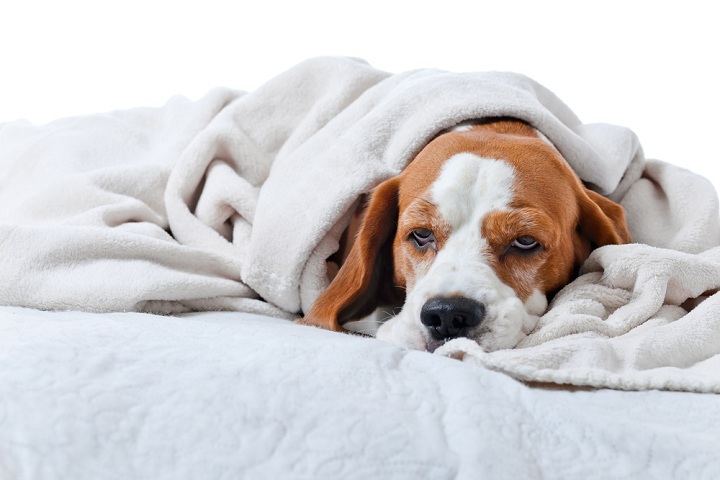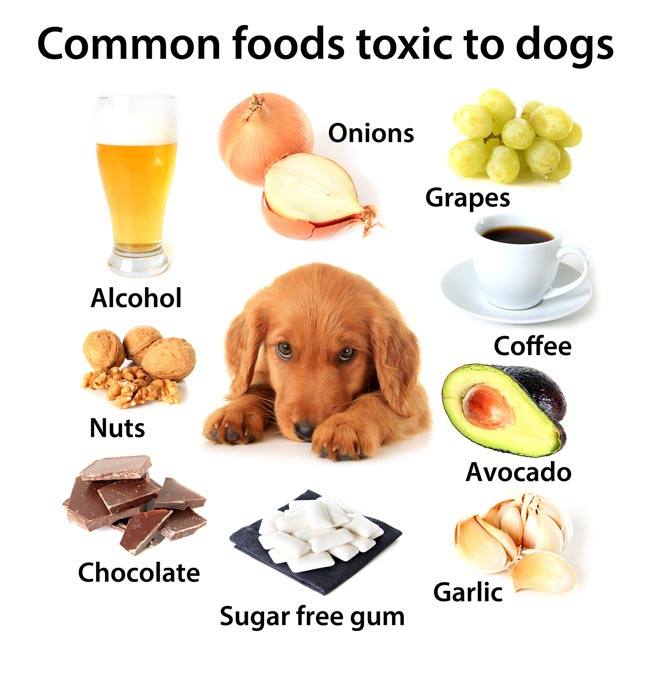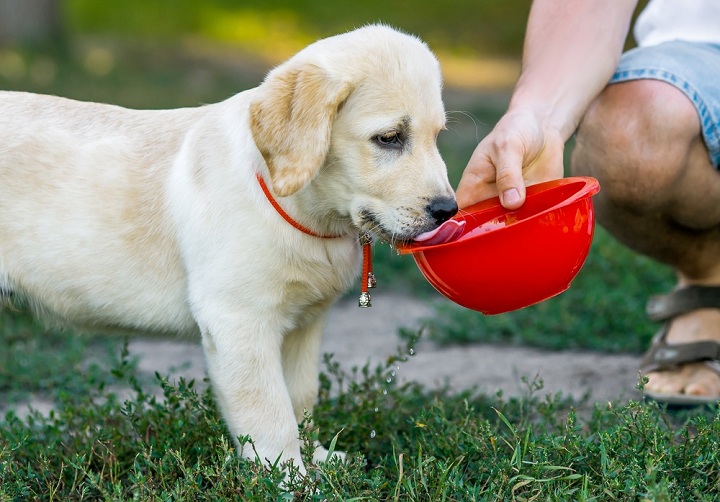How to Prevent Dog Poisoning

Few things are more distressing than seeing your pet in any kind of trouble.
Poisoning may seem extreme but there are routinely 100,000 reports of dogs suffering from poisoning each year in the US alone. Perhaps, then, it’s not as rare an occurrence as you might think.
Most cases of dog poisoning happen when they consume regular household products. Today, we’ll show you how to prevent dog poisoning. We’ll also show you what the main causes are and how to solve this disturbing issue.
First thing’s first, what causes dogs to be poisoned in the first place?
I. Causes of Dog Poisoning

There’s no single thing to watch out for but rather a range of potentially harmful substances which we’ll walk you through right now…
Medication for Humans
The pills we use to soothe our aches and pains or treat illnesses can have the opposite effect with our furry friends.
Also, it’s not necessarily the case that they need to wolf down the entire package. Even a small dose of the wrong human medication can cause your dog serious problems.
- Antidepressants: If you are taking antidepressants, make certain they’re kept far from your dog’s curious nose. Swallowing some of these pills will cause your dog to vomit copiously. Antidepressants boost serotonin in humans. Serotonin syndrome in animals is potentially lethal. Your dog’s heart rate, temperature and blood pressure will soar and, in the worst case scenario, seizure
- Isoniazid: This drug is designed to combat TB in humans but dogs are simply unable to get it into their system. If your dog eats even one or two tablets, it could result in seizures or coma
- Anti-inflammatories: While ibuprofen is a benign drug for humans with many benefits, it can lead to ulcers and kidney failure if your dog chows down on a handful
- Over the counter meds: Whether it’s Tylenol or Advil, Paracetamol or Aleve, exercise extreme caution that your dog doesn’t get amongst your OTC meds. Things designed to heal us can be overwhelmingly toxic for your dog
Medication for Pets
As you know, taking any medication in greater than the recommended dose can lead to complications in humans. Dogs are no different.
If your dog has worms or general pain and is prescribed medication by the vet, make absolutely certain that you give them no more than the stated dosage or you could find it causes more harm than good.
Certain Human Foods
Although it’s always satisfying to see your dog wolf down the remains of your tasty dinner, you need to keep your guard up when it comes to certain human foods that can wreak havoc on your dog’s delicate system.
Pay particular attention to the following:
- Chocolate: It’s no secret that chocolate can cause a very bad reaction if eaten by dogs. The problem with chocolate is the presence of methylxanthines. If your pooch nibbles on some chocolate, he’s likely to be sick. If he munches too much, he could die. Dark chocolate is most dangerous but be safe and keep those sweeties locked down and out of harm’s way
- Xylitol: You’ll find xylitol, a sweetener, in a range of products from cookies through to gum. If your dog consumes even a fairly small amount of xylitol, his blood sugar levels will crash. Seizures can follow. If you’re unlucky, it could even be fatal
- Grapes and Raisins: As with many foods that your dog’s metabolism will struggle with, grapes and raisins can induce kidney failure. Some dogs seem to manage eating grapes and raisins with no ill effects while others run into trouble after nibbling only a small quantity
- Onions: Many dogs find onions extremely appetizing. A small amount won’t cause any harm but chomping too many can provoke anemia so watch closely and be on guard
- Avocado: Avocadoes might be a healthy superfood for humans but the persin content is a dog poison. It’s not going to kill your pet but he’ll be violently sick and develop shocking diarrhea so keep those green beauties well out of reach
- Macadamia Nuts: These nuts will make your dog weak and cause his temperature to soar while also making him vomit
- Alcohol: Alcohol poisoning is an unpleasant experience. Your dog’s system will labor trying to process alcohol, his breathing will be disrupted and he could end up in a coma so leave the booze for human consumption only
Chemical Insecticides
Insects are often a nuisance and it’s only natural to fight back with chemical insecticides.
If you need to fight off any insects or rodents, be certain to follow the instructions on the package closely and keep these toxic products well away from your dog.
Household Plants
Brightening up your home with colorful plants can have a dark side if you’ve got dogs in the house…
While most plants will not lead to any kind of issues if your dog tastes them, there are several which should be given a wide berth.
For any dog owners, think seriously about sidestepping these plants:
- Daffodils
- Tulips
- Azaleas
- Sago Palms
- Rhododendrons
Disregard this advice and your dog could experience heart and liver problems, vomiting and its possible he could die.
Household Cleaners
It shouldn’t come as any surprise that dogs need to be kept well clear of household cleaning products like bleach. Humans coming into contact with these harsh chemical products can end up in all sorts of trouble. How do you think your dog’s much smaller system would cope?
So…
Now we’ve given you a solid overview of the main agents that could poison your beloved dog, how about some guidance on recognizing the signs and symptoms of poisoning?
II. Signs of Poisoning in Dogs
If you remain vigilant and avoid the above products, you should protect your dog against most known poisons.
Here are some common symptoms that indicate potential dog poisoning:
- Dark stools
- Loss of appetite
- Coughing
- Drinking too much
- Excessive urination
- Generally abnormal behavior
- Collapse
- Diarhhea
- Nausea
- Vomiting
- Eating too little
- Overall weakness and lethargy
- Strange discoloration of gums
- Drooling
While none of these symptoms are a guarantee your dog has been poisoned, if you pick up on any of the above, err on the side of safety and book in an appointment at the vets.
III. Solve Dog Poisoning The Easy Way

What should you do if you suspect your dog has been poisoned?
Well, it’s a delicate balance of not panicking but, at the same time, acting promptly to minimize the chance of any long-term damage.
Here are some handy hints to familiarize yourself with so you can snap swiftly into action:
- Round up all the poison you believe your dog has consumed. Make sure to also collect any vomit as this can be very helpful for the vet or emergency unit when determining the nature of the problem
- Jump straight on the phone and call the vet or an animal poison center. Make sure you have all the information they’ll need so you can expedite the process of returning your dog to health. The breed, weight, age and sex of your dog will help the animal experts best diagnose what’s wrong
- If the problems are related to breathing or there’s any kind of seizure, skip these steps and go directly to the vet
IV. How To Prevent Dog Poisoning From Happening
Now we’ve given you all the information you need to cope with your dog being poisoned, we’ll round out with some simple steps to stop it from happening in the first place…
- Make certain that all medication is safely tucked away out of reach of your dog. Even if the bottles have childproof caps, it’s not worth the risk that your dog will puncture the plastic bottle so lock them in a cabinet
- Do not under any circumstances feed your dog any of the human foods listed above. Stick to the occasional treat with leftovers from your dinner
- Keep pesticides and rodenticides in a safe place where your dog won’t find them. Remember that a dog can be poisoned by eating a rodent killed by rodenticides so be on high alert if you are treating a rat problem at home
- Follow the guidelines very carefully if your dog is prescribed any medication. Too much is just as dangerous as not enough
- Give the plants outlined above a swerve. You have plenty of choice without taking a chance on plants known to be dangerous
V. Wrap-Up
We trust you’ve found this look at how to prevent dog poisoning useful and informative.
Keep your guard up and watch out for the flashpoints listed above and your dog should never fall victim to poisoning in the first place. Accidents happen, though. Follow our tips for solving dog poisoning might just save the day.
Drop us a line any time if you have questions or feedback. We are always delighted to hear from our readers and happy to help in any way we can.
Now make sure your dog stays away from your stash of chocolate and come back soon!
